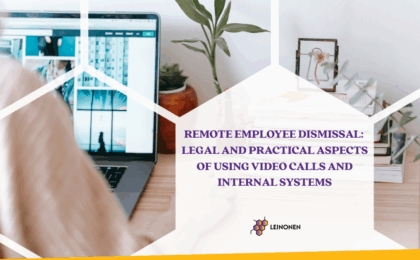Termination of employment relations is permitted only on the grounds and in accordance with the procedure as determined in the Labour Law. One of such grounds when employer can terminate employment relations is when an employee without a justified cause has significantly violated the employment contract or the specified working procedures (pursuant to Section 101(1), Point 1 of the Labour Law). The employment relations are terminated with the employer’s notice of termination of the employment contract.
Term for providing the employer’s notice of termination
In order to terminate employment relations pursuant to Section 101(1), Point 1 of the Labour Law the employer must provide the notice of termination not later than within 1 month since the date of discovery of the violation (the said 1 month’s term does not include the period of a temporary incapacity of the employee, as well as the period of employee’s vacation or the period when the employee does not perform one’s duties due to other justified reasons), but not later than within 12 months from the date of committing the violation.
Procedure for terminating the employment relations
Actions to be taken | Description |
| ||
1. | Discovery of the committed violation | The employer should prepare an act where the fact that a violation has been committed by an employee and the fact that the employer has discovered the violation is fixed (including information about the time, place and other circumstances of the violation). Employer must store and/or acquire any evidence of the committed violation (e.g. acquire written statements of other employees who witnessed the violation; store video surveillance records, etc.). | ||
2. | Determine whether the employee has violated employment contract or specified working procedures | Employer must determine that the particular actions of the employee constitutes a violation of the employment contract or the working procedures, in order to have grounds for termination of the employment relations. Working procedures in a company are governed by a collective agreement, working procedure regulations, employment contract, orders of the employer, job descriptions and other regulations issued by the management of the company, as well as the laws and regulations governing the job duties of a particular profession. To avoid disputable situations it is advisable to determine the performance of the employee’s liabilities as accurate as possible in the above mentioned documentation. Thereby the employee and the employer would have clear understanding on the type, scope, time and place of the job to be performed, and other significant aspects. | ||
3. | Inform the employee about the committed violation and requests to provide explanations | The employer must inform the employee in writing on the nature of violation, referring to the circumstances that indicate the committed violation, and request from the employee to provide written explanations within a specified period of time. If the employer’s request to provide explanations has been appropriately delivered to the employee, the fact that the employee has not provided any explanation within the prescribed term does not prohibit the employer from issuing a notice of termination of the employment relations. | ||
4. | Evaluate the severity of the violation, circumstances in which it has been committed, as well as personal characteristics of the employee and his/ her previous work | (a) The severity of the violation The employer is entitled to issue a notice of termination only if the violation committed by the employee is considered as significant. Commitment of a formal or minor violation cannot serve as grounds for termination of the employment relations. To determine that a violation is significant, the employer must determine that the violation of the employment contract or specified working procedures has caused the company, or, as a result of other circumstance, might have caused losses or impacted the usual course of business, or has caused or could have caused other adverse consequences. In the event of disputes the significance of the violation will be assessed by a court. If the committed violation is not significant, the employer is entitled to issue a reprimand or express a reproof to the employee. Reprimand or reproof must be executed in writing within one month since the date of discovery of the violation. Reprimand or reproof shall be executed in line with the procedure prescribed in the Labour Law, otherwise it will have no legal force. It should be noted, if a reprimand or reproof has been issued in regard to a committed violation, then the employer is forbidden to terminate the employment contract on the basis of the same violation. | ||
| (b) Circumstances of the violation The employer must determine that the violation has been committed without any justified cause in order to have legal grounds for termination of the employment relations. When assessing this aspect, the explanations of the employee and information at the discretion of the employer should be considered. | |||
| (c) Personal characteristics of the employee and his/ her previous work Employer must assess and take into consideration the previous work and the personal characteristics of the particular employee. It is recommended to record in writing this assessment. In the assessment, for example, the following aspects can be considered: – Work performance results of the employee; – Other violations of the employee, for which the employer has issued a reprimand or a reproof. It should be noted that, if within 1 year after issuance of a reprimand or reproof, a new reprimand or reproof has not been issued to the employee, the employee shall be considered as disciplinary unpunished. Consequently, reprimands and reproofs that have been expired cannot be takes into consideration in the assessment of the employee; – Other objective circumstances that can be considered as significant. | |||
5. | Determine whether and for how long the employee has been a member of a trade union | The employer must request in writing the employee to provide the following information: (1) whether the employee is a member of a trade union; (2) for how long the employee has been a member of a trade union. If the employee has been a member of a trade union for more than 6 months, the employer must acquire a consent from the trade union before terminating the employment relations. | ||
6. | Obtain a consent from a trade union (if necessary) | If a consent from the trade union is necessary, the employer must submit a request to the respective trade union asking the trade union to provide consent to termination of the employment relations. If the trade union fails to inform the employer of its decision within 7 working days, it is considered that trade union has agreed on the termination of the employment relations. If the trade union does not agree with the termination of the employment contract, the employer, within 1 month after receipt of the reply of the trade union, is entitled to file a claim to a court requesting termination of the employment contract. | ||
7. | Consider conditions, under which it is prohibited to provide a notice of termination | Under the Section 109 of the Labour Law it is prohibited to terminate employment relation on the grounds of Section 101(1), Point 1 during: – the period of temporary incapacity of the employee; – the period when the employee is on a vacation or is not performing work due to other justifiable reasons. | ||
8. | Provide the notice of termination to the employee
| The employer must prepare a written notice of termination of the employment contract and notify the employee thereof. It is mandatory to indicate in the notice of terminate the circumstances, based on which the employment contract is terminated. When terminating the employment contract pursuant to Section 101(1), Point 1 of the Labour Law, the time period of the notice on termination is 10 calendar days. The mentioned time period shall be counted form the date when the notice of termination was notified to the employee. The employer can notify the notice of termination as follows: – In person (recommended to obtain the employee’s signature on the notice of termination, confirming the fact that he/she has received the notice of termination); – If the employee refuses to receive the notice of termination in person, the employer may read out the notice loudly to the employee in the presence of two witnesses, fixing the fact in an employer’s act; – Via post as a registered letter to the employee’s address. In such case the notice shall be regarded as notified on the seventh day after handing the letter in the post office; – Via e-mail, using a secure e-signature, only if in the employment contract or the collective agreement the parties have expressly agreed that e-mail shall be considered as acceptable means of communication between the parties. In such case the notice shall be regarded as notified on the second working day after sending the e-mail. | ||
9. | Disbursement of sums due to the employee | All sums (salary, compensation for unused vacation, unpaid advance payments and other settlements, if applicable) due to the employee must be paid on the last working day of the employee. | ||
Other significant aspects to be considered
1) Ascertain whether the particular employment agreement or the applicable collective agreement does not foresee special provisions regarding termination of the employment contract.
2) Evaluate the necessity to set an idle time for the employee while the violations is being investigated or for the period from notifying the notice of termination until the last working day of the employee.
3) The actions necessary to terminate the employment contract have to be documented and carried out without delay, considering the short term, within which the employer is entitled to provide a notice of termination.
4) The employer must differentiate between situations when the employer is entitled to terminate the employment contract based on other grounds that are related to the behaviour of the employee (pursuant to Section 101(1), Points 2–4 of the Labour Law). Employer should consider that in order to terminate the employment contract pursuant to other grounds provided in the Labour Law each of the grounds has different circumstances that the employer has to determine in order to be entitled to terminate employment relations. Different grounds of termination also have different time periods of employer’s notice.
5) The employee is entitled to file a claim to the court on recognising the notice on termination as invalid within 1 month after the receipt of the notice. If the employer’s notice on termination has no legal grounds or the procedures prescribed for termination of employment contracts have been violated, such notice in accordance with a court judgement shall be declared as invalid and, upon request of the employee, the court can reinstate the employee in the work.
6) In the event of disputes, the employer must prove that the notice of termination has legal grounds and that the procedure of issuing the notice complies with the laws. If the employee has filed a claim on reinstatement, the employer is obliged to prove that by making an employee redundant the employer has not violated the employee’s rights to continue employment legal relationship.
If you need assistance with termination of employment relation or you have any questions regarding other labour law issues, we invite you to contact the lawyers of Leinonen Latvia.
This information has been prepared by Leinonen Latvia, Tax & Legal Advisory Department.



